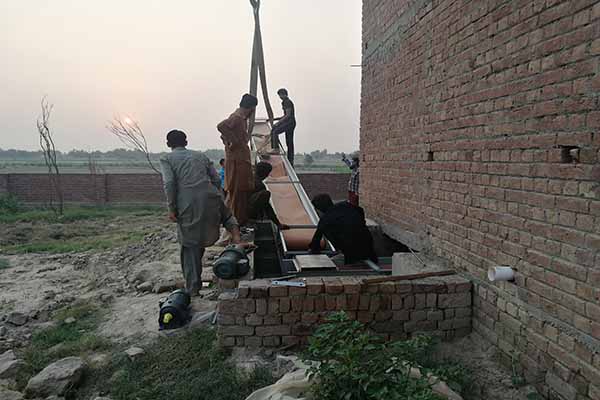Tanzania’s 10,000 Chicken Farm Embraces Automation with Livi’s Automatic Feeding System
Time : 2025-07-25
In the heart of Tanzania, a 10,000 chicken farm has revolutionized its feeding process with the introduction of Livi’s Automatic Feeding System. As a leading Chinese manufacturer of poultry equipment, Livi Machinery is proud to have supplied this state-of-the-art solution to enhance the efficiency and productivity of the farm.
The farm, nestled in the scenic landscapes of Tanzania, has long been a hub for poultry farming. However, like many other farms, they faced challenges in ensuring that their chickens received the right amount of feed at the right time. This is where Livi’s Automatic Feeding System came into play, offering a seamless and efficient solution.
Understanding the Challenges
Farming, especially poultry farming, requires meticulous attention to detail. The process of feeding chickens manually can be time-consuming and prone to errors. Overfeeding or underfeeding can lead to various issues, including health problems and reduced productivity. The farm owners in Tanzania were well aware of these challenges and were looking for a solution that could streamline their feeding operations.
Introducing Livi’s Automatic Feeding System
Livi’s Automatic Feeding System is designed to address these challenges head-on. The system is a marvel of modern technology, ensuring that each chicken receives the precise amount of feed required for optimal growth and health.
Key Features
– Precision Feeding: The system is equipped with advanced sensors that accurately measure the feed consumption of each chicken, ensuring that no feed is wasted.
– Customizable Feeding Schedules: The system can be programmed to feed chickens at specific times, taking into account their dietary needs and growth stages.
– User-Friendly Interface: The intuitive control panel allows farm managers to easily set up and manage feeding schedules, making it accessible to users of all skill levels.
– Remote Monitoring: With the ability to monitor the system remotely, farm managers can stay informed about the feeding process at all times, even when they are not on-site.
The Implementation Process
The implementation of the Automatic Feeding System was a collaborative effort between Livi Machinery and the farm’s management team. Here’s a glimpse into the process:
1. Site Assessment: Livi’s team conducted a thorough assessment of the farm to understand its specific needs and requirements.
2. System Design: Based on the assessment, Livi’s engineers designed a custom feeding system tailored to the farm’s size and layout.
3. Installation: The system was installed by Livi’s skilled technicians, ensuring that all components were properly set up and integrated.
4. Training: Farm staff were trained on how to use the system effectively, ensuring a smooth transition from manual to automated feeding.
The Impact
Since the implementation of the Automatic Feeding System, the farm has experienced several positive changes:
– Increased Productivity: The system has significantly reduced the time and labor required for feeding, allowing farm staff to focus on other important tasks.
– Improved Health: With precise feeding, the chickens have shown better growth rates and fewer health issues.
– Cost Savings: By reducing feed waste and improving efficiency, the farm has seen a decrease in operational costs.
Testimonials
“The Automatic Feeding System from Livi Machinery has been a game-changer for our farm. It’s not just about the technology; it’s about the peace of mind it brings. We know our chickens are getting the right amount of feed at the right time, and that’s huge for us,” said the farm’s manager.
Conclusion
Livi Machinery’s Automatic Feeding System has proven to be a valuable asset for the 10,000 chicken farm in Tanzania. By embracing automation, the farm has not only improved its operations but also set a new standard for poultry farming in the region. As a leading manufacturer of poultry equipment, Livi Machinery is committed to providing innovative solutions that enhance the efficiency and sustainability of farming operations worldwide.












